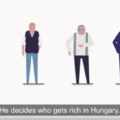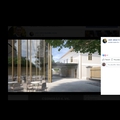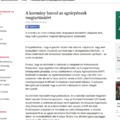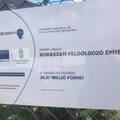"Jó az, hogy az orosz vezetéssel ilyen szoros kapcsolatokat ápoló személy irányítja a trollgyárakat?" kérdezte többek között a "Putyin séfje"-ként ismert vendéglátóipari vállalkozóra, Prigozsinra utalva Putyin ausztriai látogatása előtt Armin Wolf az ORF tévécsatorna riportere. A június 4-én készített interjú teljes, angol nyevű leiratát a Kreml hozta nyilvánosságra, a Bozótharc pedig most magyarul közli. A fordításért köszönet Hegedűs Juditnak és Horn Gabriellának.(Fotó: Kreml, a Putyin-Wolf beszélgetés itt megnézhető németül.)
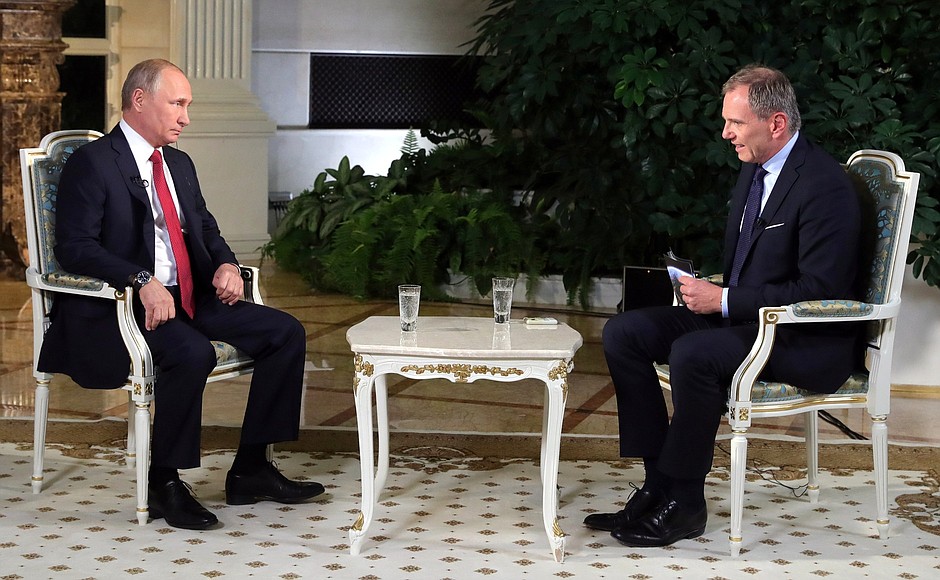
Armin Wolf: Sokáig Ön volt a kormánypárt feje, Most Medvegyev úr az. Sok megfigyelő szerint az orosz vezetés az Egységes Oroszország párton keresztül azért szeretne kapcsolatot tartani az európai nacionalista pártokkal, hogy megossza az Európai Uniót. Hogyan értékeli az orosz vezetés szoros kapcsolatát az EU-val szemben kritikus pártokkal?
Vlagyimir Putyin: A kérdést inkább Medvegyev úrnak, az orosz miniszterelnöknek és pártvezetőnek kellene feltenni. De annyit meglehetős bizonyossággal mondhatok, hogy nem célunk senki és semmi megosztása Európában. Épp ellenkezőleg, azt szeretnénk, ha az Európai Unió egységes és prosperáló lenne, hiszen az EU a legnagyobb kereskedelmi és gazdasági partnerünk. Minél több probléma van az Európai Unióval, annál nagyobb kockázatokkal és bizonytalansággal kell nekünk is szembenéznünk.
A puszta tény, hogy ez Európai Unió országaival folyó kereskedelmünk megfeleződött, 400 milliárdról 250 milliárdra csökkent, magáért beszél. Miért akarnánk, hogy tovább csökkenjen? Miért ingatnánk meg az Európai Uniót, ha az nekünk árt, költséggel jár vagy elesünk az Európai Unióval való együttműködés lehetséges hasznától?
Ellenkezőleg, erősítenünk kell az Európai Unióval való együttműködést. Abban, hogy kivel, milyen intenzíven működünk együtt, csupán pragmatikus megfontolások vezérelnek. Azokkal kívánunk együttműködni, akik egyértelműen kinyilvánítják, hogy készek és hajlandóak velünk együttműködni. Ez az egyetlen oka annak, hogy politikai pártjaink, csoportjaink és mozgalmaink bizonyos európai szervezetekkel vannak kapcsolatban politikai és párt szinten, és nem az, hogy meg akarnánk rendíteni az Európai Uniót, vagy meg akarnánk valamit akadályozni az Unión belül.
Arany- és valutatartalékunk 40 százalékát euróban tartjuk. Miért ásnánk ezt, vagy az egységes európai valutát alá az Unió meggyengítésével? Szeretném, ha az osztrákok és az Európai Unió más népei is kivernék a fejükből ezt a gondolatot.
Armin Wolf: A nyugat-európai kormányok, és elsősorban az Egyesült Államok, mindazonáltal azzal vádolják Oroszországot, hogy hekkereken keresztül beavatkoznak más országok belpolitikájába. Ön minden interjújában kijelenti, hogy ez nem igaz; ahhoz viszont nem fér kétség, hogy a szentpétervári Internet Research Agency már évek óta igyekszik befolyásolni a nyilvános vitákat a Facebookon keresztül. Az úgynevezett trollgyárakat Jevgenyij Prigozsin birtokolja, akit Ön is nagyon jól ismer, “Putyin séfjének” is szokták nevezni, ő gondoskodik az elnöki fogadások cateringjéről. Jó az, hogy az orosz vezetéssel ilyen szoros kapcsolatokat ápoló személy irányítja a trollgyárakat?
Vlagyimir Putyin: Ön először “Oroszországot” említette, majd rögtön utána a hekkereket, ugyebár? Amikor “Oroszországról” beszélt, az orosz államot értette, vagy egyes orosz állampolgárokat, hekkereket, vagy akár jogi személyiségeket?
Armin Wolf: Prigozsin urat értettem.
Vlagyimir Putyin: Mindjárt beszélek Prigozsin úrról.
Kérem, tegyen különbséget az orosz kormány, az orosz állam, az orosz állampolgárok és bizonyos jogi személyiségek között.
Az imént az mondta, hogy Prigozsin urat “Putyin séfjének” szokták nevezni. Valóban, vendéglátó ipari üzletet vezet, ez a munkája; étterme van Szentpétervárott. De hadd kérdezzek valamit: komolyan gondolja, hogy egy vendéglátós, még ha van is lehetősége hekkelésre és van hekkeléssel foglalkozó magánvállalkozása – bár én nem ismerem Prigozsin úr tevékenységeit – ezt arra tudná használni, hogy befolyásolja az Egyesült Államok vagy egy európai ország választását? Lehetséges volna, hogy a szilárd Nyugat országaiban a média és politikai normák olyan mélyre süllyedtek, hogy egy orosz vendéglős befolyásolni tudja a szavazókat egy európai országban, vagy az Egyesült Államokban? Nem nevetséges ez?
Armin Wolf: Elnök úr, szép dolog a vendéglőzés, csakhogy nem igaz, hogy Prigozsin úr egyszerű vendéglátós volna. Nem csak éttermeket üzemeltet, hanem rengeteg más vállalkozása is van, amelyek a hadügyminisztériummal állnak szerződésben és sok kormányzati megrendelést kapnak; Prigozsin úr dollármilliókat költ a trollgyárra, az ottani emberek írják a posztokat. Miért van szüksége egy vendéglősnek erre?
Vlagyimir Putyin:.Kérdezze meg tőle. Oroszországnak, mint államnak ehhez semmi köze.
Armin Wolf: De Ön nagyon jól ismeri az illetőt.
Vlagyimir Putyin: És akkor mi van? Sokakat ismerek Szentpétervárott és Moszkvában. Kérdezze őket.
Van az Egyesült Államokban egy személy, Mr. Soros, aki a világon mindenbe beleavatkozik. Sokszor hallom amerikai barátaimtól, hogy ‘Amerikának, mint államnak semmi köze hozzá’. Olyan pletykák keringenek, hogy Soros euró árfolyamának ingadozására játszik. A szakértők már vitáznak ezen. Kérdezze az amerikai külügyminisztériumot, miért teszi ezt Soros. Azt fogják válaszolni, hogy semmi közük hozzá, ez Soros úr magánügye. Nálunk pedig Prigozsin úr magánügye. Ez a válaszom. Kielégíti?
Armin Wolf: Prigozsin urat 12 orosz állampolgárral egyetemben az Egyesült Államokban vád alá helyezték az elnökválasztásba való beavatkozásért. Ön és Donald Trump ugyan nagyon jól el szoktak beszélgetni telefonon, de Trump másfél éve elnök, és még nem került sor bilaterális találkozóra Önök között, míg Bush-sal és Obamával elnökségük első hat hónapjában találkozott. Miért húzódik ennyire a dolog?
Vlagyimir Putyin: Amerikai kollégáinkat kellene kérdeznie. Szerintem az Egyesült Államokban folyó akkut politikai harc az oka. Először is Donald Trump és én számos nemzetközi helyszínen találkoztunk, másodszor, rendszeresen beszélünk telefonon. Külügyminisztériumaink és különleges szolgálataink elég jól együttműködnek közös érdekeinket érintő területeken, elsősorban a nemzetközi terrorizmus elhárításában. Ez a munka folyamatos.
Ami a személyes találkozókat illeti, ezek lehetősége jobbára az Egyesült Államok belpolitikai helyzetétől függ. Indul a kongresszusi választási kampány, aztán jön a következő elnökválasztás, és az Egyesült Államok elnökét többféle ügyben is támadják. Nézetem szerint ez a fő ok.
Nemrégiben Donald egy telefonbeszélgetés során azt mondta, aggódik egy újabb fegyverkezési verseny kirobbanása miatt. Teljesen egyetértek vele. Azonban egy esetleges fegyverkezési verseny (mi nem kezdeményezünk ilyen folyamatot, nem léptünk ki a fegyverkorlátozási egyezményből, csupán reagáltunk a minket érő fenyegetésre, de teljes mértékben egyetértek az amerikai elnökkel) megakadályozásához az kell, hogy gondolkodjunk, lépjünk, és összehangolt utasításokat adjunk az orosz és az amerikai külügyminisztériumnak. A szakértőknek konkrét megoldást kell találniuk. Remélem, hogy az Egyesült Államok és Oroszország, sőt az egész világ érdekeit szolgáló munka valamikor meg is fog kezdődni, többek között kettőnk között személyesen.
Armin Wolf: Sokan aggódnak az ászak-koreai helyzet miatt. Lavrov külügyminiszter nemrég járt is ott. Ön szerint előfordulhat egy "nukleáris leszámolás" az Egyesült Államok és Észak-Korea között?
Vladimir Putyin: Erre még gondoni sem akarok. Rémes elképzelés. Leginkább Oroszországnak nem lenne érdeke egy ilyen konfliktus, hiszen Észak-Korea az egyik szomszédunk. Az egyik nukleáris kísérleti telepük, azt hiszem az, amelyekt msot kézülnek épp bezárni, ha jól emlékszem minössze 190 kilométerre van azorosz határtól. Ez számunkra abszolút valóságos tény.
Tehát mindent megteszünk a koreai félszigeten meglévő feszültségek enyhítése érdekében.Így nagy reményeket fűzünk Trump és a koreai elnök személyes találkozójához is, hiszen már most túl messze ment mindkét fél a követeléseikkel...
Szerintem Észak-Korea demilitarizálásának kétirányú folyamatnak kell lennie. Ha az orszég vezetője betartja és gyakorlati lépésekre váltja az ígéreteit, például megszabadul a ballisztikus rakétáiktól, visszalép az újabb nukleáris tesztektől, akkor a másik félnek is egyértelmúen látható lépésekkel kellene viszonoznia ezt. Így kontraproduktívnak tartom a hadgyakorlatokat és kapcsolódó haditevékenységek folytatását. Remélem, a helyzet pozitív irányban fog változni.
Mi a magunk részéről mindent megteszünk ennek érdekében.(...) (A Koreára vonatkozó többi részt időhiány miatt kihagyjuk, az angol nyelvú oldalon megtekinthető.)
Armin Wolf: Az egyik legösszetettebb probléma Oroszország kapcsán Ukrajna. 2014-ben Ukrajnában lőtték le a maláj légitársaság MH17 -es gépét, a fedélzetén 290 emberrel. A nemzetközi vizsgálóbizottság a múlt héten bejelentette, hogy a gépet az orosz hadsereg által is használt lövedék találta el, s hogy azt a kelet-ukrajnai lázadók segítségére érkezett orosz konvojról lőtték ki. Videofelvétel, rögzített telefonbeszélgetések és több tucat szemtanú vallomása is alátámasztja ezt. Ön mégis egy éve folyamatosan azt hangoztatja, hogy nem igaz, pedig senki nem hiszi el ezt Önnek. Nem kockáztatja ezzel az orosz fél állításainak a hitelét/igazságtartalmát? talán most már el kellene ismerniük, hogyezt a szörnyű tettet a kelet-ukrajnai lázadók követték el, az orosz hadsereg eszközeivel.....
Vladimir Putyin: Szeretném megjegyezni, hogy e konfliktusban mindkét fél szovjet és orosz gyártmányú fegyvereket használ: az ukrán hadsereg és a csak a parancsnokuknak felelősséggel tartozó önkéntesek csakúgy, mint a donbaszi fegyveresek. Mindkét fél rendelkezik sokféle eszközzel: lőfegyverekkel, harci repülőkkel, légelhárítási eszközökkel, amik mond Oroszországban készültek.
Armin Wolf: Igen, de mostanra tudjuk, hogy milyen lövedék találta el a maláj gépet: egy Buk, ami az egyik kurszki orosz brigádtól származott. Ez tény, Ön mégis tagadja. Nem lenne egyszerűbb elismerni, hogy orosz lövedék találta el a gépet? Nem lenne jobb inkább hivatalosan elismerni, hogy Oroszország fegyverszállítmányokkal segítette a kelet-ukrajnai lázadókat?
Vladimir Putin: Ha most megpróbál olyan türelmes lenni, amennyire csak tud, és hagyja befejeznem, amit mondani akarok, akkor megismerheti a véleményem erről.
Mint mondtam, mindkét félnek orosz gyártású fegyverei vannak, s ugyanazokat a szovjet és orosz gyártású eszközöket használja az orosz hadsereg is, amikről most (az ügyet vizsgáló) szakértők beszélnek. Ez az egyik. Az orosz szakértőket pedig nem engedik a vizsgálat közelébe, az érveinkte nem veszik figyelembe, és a vizsgálóbizottságban senkit nem érdekel a véleményünk. Ugyanakkor az ukrán félnek, akik ugyanúgy érintettek az ügyben, hozzáférést adnak. Márpedig mindenképp ők a felelősek azért, hogy az utasszállítót beengedték a konflitus átal sújtott területre, s ezzel megsértették a nemzetközi szabályozást (ICAO).
(A fordítást folyamatosan egészítjük ki, mivel közben dolgozunk is.)
We are still unable to get answers to some questions regarding the activities of Ukrainian air forces in that region, at that place and at that time. The tragedy we are talking about is terrible, and I feel immensely sorry for the victims and their families, but this investigation must be objective and comprehensive.
Just a second, please, do not rush. Let me speak, otherwise we are going to have a monologue on your part instead of an interview.
Armin Wolf: Nevertheless, let me say briefly – yes, we know where the missile came from. But what do Holland, Australia or Malaysia have to gain by blaming Russia if it was not a Russian missile that belonged to the Russian army?
Vladimir Putin: We do not see it that way; we have a different point of view. You now listed countries that allegedly believe that it was a Russian missile and that Russia is implicated in that terrible tragedy. I regret to disappoint you. Quite recently, Malaysian officials declared that they do not see Russia’s complicity in that tragic event; they have no proof that Russia is implicated. Are you really not aware of that? Did you not see the statements by Malaysian officials?
What do we think about this issue? If we really want to get to the bottom of things in that horrendous event and reveal all the factors that would allow us to render a final conclusion, all arguments should be taken into account, including the ones offered by Russia. And it would be entirely fair for Russian experts to have access to the investigation.
Armin Wolf: The international investigative commission now claims that they have in fact taken into account all arguments. Many people do not believe Russian arguments because a few years ago in Crimea you said that the famous “green men,” the fighters in green uniforms without identifying insignia, were all local self-defense forces. But a little later it was revealed that they were indeed Russian soldiers. After that, you admitted many times that those were Russian army personnel even though you denied that earlier. Why should we believe you now?
Vladimir Putin: Now that you mentioned Crimea. Do you know that in the mid 2000s, right in the vicinity of Crimea, a Russian civilian jet was downed over the Black Sea? It was done by the Ukrainian army during a drill. And the first reaction of the Ukrainian officials was that Ukraine had nothing to do with it. A civilian plane was shot down en route from Israel to Russia. Everyone onboard died, of course. Ukraine flatly denied its involvement in that terrible incident but had to admit it later. And why should we believe Ukrainian officials? So in response to your question about Crimea, I put the ball back in your court.
Armin Wolf: I am not talking about Ukrainian officials, I am talking about you. You said many times in 2014 that you used the Armed Forces in Crimea to block Ukraine’s interference. Later you admitted though that the Russian army was in Crimea, something you had denied before.
Vladimir Putin: Russian forces have always been stationed there. Look, I would like you to try to understand what was actually happening there, not just repeat these things mechanically. Russian forces have always been present in Crimea. Our military contingent was there.
One second, please, let me finish. Do you want to fire questions non-stop or hear my answers?
The first thing we did when the events in Ukraine began… What kind of events? Let me tell you now, and you will say yes or no. It was an unconstitutional armed coup and seizure of power. Yes or no? Will you tell me?
Armin Wolf: I am not an expert on the Ukrainian Constitution.
Vladimir Putin: You do not have to be an expert on Ukraine; you just need to be an expert on law, on the constitutional law of any country.
Armin Wolf: I would not like to talk about Ukrainian politics, but about Russian politics. Allow me to phrase it differently. What should happen in order for Russia to return Crimea to Ukraine?
Vladimir Putin: There are no such conditions and there can never be.
I will tell you why. You interrupted me again, but if you actually let me finish, you would understand what I mean. I will still do it.
When the unconstitutional armed coup took place in Ukraine, and power changed hands by force, our army was legally deployed in Crimea – under the agreement on our military base there. The first thing we did was increase our contingent to guard our Armed Forces, our military facilities, because we immediately saw that they were being threatened. That is where it all began. I told you with confidence that there was no one else there, but our Armed Forces were there legally under an agreement.
Let me finish, for God’s sake. (Speaks German.) Seien Sie so nett, lassen Sie mich etwas sagen. [Please be so kind as to let me say something.]
Armin Wolf: I hate to interrupt you, but it is not about the Russian Black Sea Fleet. It was certainly based there. It is about those uniformed fighters without insignia. You said they were Crimeans, but they were not Crimeans; they were Russian servicemen.
Vladimir Putin: I will get to this, please be patient. We have enough time.
Our servicemen had always been stationed there. I said: our servicemen were there, but they did not get involved. But, when unconstitutional actions in Ukraine began to unfold, when people in Crimea felt danger, when trains started bringing aggressive nationalists there, when buses and personal vehicles were blocked, people naturally wanted to protect themselves. And the first thing that occurred was to restore the rights that Ukraine itself had issued by granting Crimea autonomy. This is where it all began – with a procedure in the parliament to establish its independence from Ukraine.
Now, is this strictly prohibited by the United Nations Charter? No, it is not. The right of nations to self-determination is clearly stated there. And what did our Armed Forces do, even without expanding the contingent stipulated by the military base agreement? They ensured the independent free elections – an expression of the will of the people living in Crimea. By the way, the decision to hold this referendum was made by the Crimean parliament, which was elected in strict accordance with the Constitution and the laws of Ukraine before any such events. Therefore, nothing illegal …
Just a second.
Armin Wolf: As far as I know, the parliament had no right to make this decision. But let us continue our conversation. The annexation of Crimea was the first time a country in Europe annexed part of another country against its will. This was really seen as a threat to neighbouring states, from Poland to the Baltic states, because it was assumed that minorities in these countries could also receive protection from Russian forces.
Vladimir Putin: You know, if you do not like my answers, then do not ask me questions. But if you want to hear my opinion on the issues that I raise, then you need to have patience. I need to finish.
So, Crimea gained independence through the free will of the Crimeans expressed in an open referendum, not as a result of an invasion by Russian forces.
You are talking about annexation, but can we call a referendum held among all people living in the region annexation? Then Kosovo's self-determination was also annexation. Why do you not say Kosovo was annexed after the invasion of NATO troops? You do not say that. You are talking about the Kosovars’ right to self-determination.
The Kosovars did this by a parliamentary decision alone, while the Crimeans did it in a referendum, with an over 90 percent voter turnout – people living in Crimea came to vote for independence, and then for uniting with Russia, with about the same turnout – about 90 percent. Is this not democracy? What is it then? And what is democracy?
Armin Wolf: Mr President, the referendum was still unconstitutional.
Vladimir Putin: Why?
Armin Wolf: It did not comply with the Ukrainian legislation, the Ukrainian Constitution. It was not a free referendum, Western observers say.
As for what you are saying about Kosovo, you have called Kosovo’s declaration of independence immoral and illegal, and have not recognised it yet. How can this be?
Vladimir Putin: This is quite possible, and I will tell you why. Because during the political changes and military conflict in the former Yugoslavia, the UN Court issued a decision with regard to Kosovo (I can give you a quote), which explicitly said (read it and then read it out loud for your viewers and listeners): “The consent of the central authorities of the country is not mandatory in determining the issues of sovereignty.” This is how the UN Court commented on the Kosovo events, and now you are saying…
Armin Wolf: There were some very clear conditions there that were not met in Crimea. This is what all international observers say.
Vladimir Putin: What are they?
Armin Wolf: There is no one who would recognise that vote, there is no one who would recognise the annexation.
Vladimir Putin: Your arguments sound completely unconvincing, because no one has to recognise the will of citizens residing in a certain area. This fully complies with the UN Court decision. There is no other interpretation, but some people are trying to find ways to interpret this situation differently.
Armin Wolf: May I take you at your word?
Vladimir Putin: Try it.
Armin Wolf: If so, then apparently people in Chechnya, Daghestan and Ingushetia could also organise a referendum and secede from Russia? Or organise an Islamic caliphate in your territory?
Vladimir Putin: Indeed, Al-Qaeda extremists wanted to tear off this territory from the Russian Federation and form a caliphate from the Black Sea to the Caspian Sea. I do not think that Austria and Europe would have been happy about it, or anything good would have ever come of it. But the Chechen people made an entirely different decision during voting, and eventually signed an agreement with the Russian Federation following a discussion after all the bloodshed. The Russian Federation, too, had to take a very difficult decision to give Chechnya and many other regions a status that determines the high level of their autonomy within the Russian Federation. Ultimately, that was the decision of the Chechen people, and we are very happy about this and we stick to those agreements.
Incidentally, the same could be done in Ukraine in regard to Donbass. Why has this not been done yet? Then Ukraine would not have to limit the use of the languages of foreign minorities, meaning not only Russian, but also Romanian, Hungarian and Polish. They do not seem to discuss this much in Europe, but it is a modern reality.
Armin Wolf: The last question on Ukraine. Do you think the Ukrainian problem would be resolved if Ukraine declared itself a neutral country like Sweden or Austria and would not join NATO?
Vladimir Putin: This is one of the problems, but not the only one. I have already mentioned the limited use of native languages of ethnic minorities. Ukraine adopted the law on language, which was criticised, including in Europe, but it is in force. This largely complicates the situation in Ukraine. But I will remind you – and these are the things very few people know about – that the ideologists of Ukrainian independence, Ukrainian nationalists insisted on creating a sovereign Ukrainian state, independent from Russia, as early as in the 19th century. But many of them also spoke about the need to maintain good relations with Russia, the need to form an independent Ukrainian state on federative principles, and so on. As early as in the 19th century. Today, I would say it is one of the most sensitive internal issues in Ukraine. And Ukraine is doing it itself.
As for the neutral status, this issue is up to the Ukrainian people and the Ukrainian leadership. For us, for Russia, the important thing is that there would be no military facilities in Ukraine that could threaten our security, such as new missile defence systems aimed at thwarting our nuclear potential. This is indeed important for us, I am telling you frankly. But ultimately, this is the choice of the Ukrainian people and the country’s legitimately elected authorities.
Armin Wolf: I would like to ask you a question about Syria before we move on to Russia. You say everyone is talking about the use of chemical weapons there, but the story was invented, since al-Assad and his army have no chemical weapons. Now there is proof that, although some of the attacks were indeed carried out by terrorists, al-Assad’s forces accounted for others, many of them in fact. Nevertheless, Russia is blocking the decision to extend the commission’s work. Why are you doing this? Why are you defending a regime that uses chemical weapons against its people?
Vladimir Putin: You just said there is proof accepted by everyone that al-Assad used chemical weapons. Well, not by everyone. Our experts tell it differently. For example, the case that was the reason for missile strikes against Syria after the alleged chemical attack in the city of Douma.
Look. The Syrian troops liberated that area. We immediately suggested to our partners that the OPCW commission go there, it is a UN unit, the Organisation for the Prohibition of Chemical Weapons. They headed for Syria, and reached a neighbouring country, Lebanon I think. But, instead of waiting one or two days and allowing the commission to work on the site, a missile attack was made on Syria.
Tell me, please: is this the best way to ensure the objectivity of what happened there? I do not think so. I think it was an attempt to create conditions that would make it impossible to investigate thoroughly. That is what it was.
After that, we found people there who admitted to having participated in staging the chemical attack. If you did not see it, it would be very useful for objectivity, so that your viewers could have their own opinion on this matter.
We found children and their parents who were drenched in water and who said they did not understand what was happening. We brought them to The Hague to show everyone. Nobody wanted to listen to them. And after that you tell me: “Everyone recognises the use of chemical weapons.” Not everyone. We believe it is fake news, used as a pretext for the missile attack, which is a violation of international law. That was aggression against a sovereign state. Who mandated an attack on a sovereign state? The UN Security Council? No. So, what was that? Aggression.
Armin Wolf: Mr President, we should not talk about Douma, because the investigation is still underway there, but the international commission proved that before that, the Syrian regime had used chemical weapons often enough. And after that you wrapped this commission up in the UN.
Vladimir Putin: Because its work is being hindered. Missile attacks were carried out days before it was to start working in Douma. What was that for? This is the first point.
Second. The case should be investigated objectively, and we will recognise it.
You just said there is proof that militants used chemical substances and chemical weapons. Who punished them? Tell me.
Armin Wolf: That same commission …
Vladimir Putin: No, I am asking you, who punished them? Have they received any punishment? Did the coalition attack them immediately? I did not see anything like this.
Armin Wolf: Mr President, I am being told that we are running out of time. I would like to talk about Russia since there is very little time left.
Vladimir Putin: Sure.
Armin Wolf: During the election race in 2012, you promised that you will significantly improve the quality of life in Russia by 2020. However, in the subsequent years, economic growth has remained rather weak, under two percent. Wages have gone down in the past two years and the number of people below the poverty line has increased compared to 2012. Are you really just looking for foreign policy challenges to justify domestic problems?
Vladimir Putin: I want everybody who thinks like that to calm down. Since 2012, Russia has been through some very difficult challenges in the economy. And that was not only related to so-called sanctions or restrictions. It was primarily due to a drastic drop in the prices of our traditional export products. The prices dropped by half. That affected the budget revenue and, therefore, people’s income. But we managed to do the main thing – and our colleagues, including IMF senior officials, acknowledged that just recently at the St Petersburg International Economic Forum. We achieved the main thing, which is to preserve and strengthen the macroeconomic stability in the country.
Indeed, wages have sagged a bit along with people’s incomes but if you look back to the beginning of our journey, the number of people below the poverty line is now half the number in 2000. Half that number. Between 2012 and 2016 and in 2017 the figure ticked upward but it is levelling out now.
The inflation rate was 12.5 percent, almost 13 percent, and now it is the lowest in modern Russian history – 2,5%. Our gold and foreign currency reserves are growing. After the collapse I mentioned, stable economic growth began to show. Yes, it is modest at the moment (1.5 percent) but fixed investment is growing at 4.4 percent, which guarantees further economic growth. Foreign direct investment has almost doubled. As I said, both the Central Bank gold and foreign currency reserves and the Government reserves are growing. We have created great conditions for the next steps on economic development, which we will definitely take.
Armin Wolf: You have been President or Prime Minister for 18 years. Some people say that you have turned a country that was on its way to democracy into an authoritarian system, that you are a ‘tsar’ here. Is it true?
Vladimir Putin: No, it is not true. It is false and completely detached from reality because Russia is a democracy and we all live under the Constitution. And our Constitution says (just like the Austrian Constitution, I think) that the President can serve no more than two consecutive terms. That is why after two legitimate terms I left office, I did not try to change the Constitution and went on to serve in another role, as Prime Minister of the Russian Federation. After that, as you know, I came back in 2012, ran for president and won the election. One presidential term in Russia is six years – also like in Austria, I think.
The voter turnout in the recent election was almost 70 percent. This is almost half of all Russian citizens. International observers had no serious criticism as to how the election was organised or regarding the election results. Therefore, there is no doubt that democracy has taken hold in Russia. It is in our interests that the country follows a democratic path of development and it will.
The same goes for other elections, municipal and regional. Hundreds of elections take place across the country and unfailingly bring success to the political forces that win people’s trust.
Armin Wolf: However, the most prominent opposition leader in Russia, blogger Alexei Navalny, could not run for president this time. You still have never said his name in public, Alexei Navalny, even once. Why?
Vladimir Putin: We have many rebels here, just like in your country and the United States.
In my conversation with your colleague I already mentioned that there was a movement in the US called Occupy Wall Street. Where are they now? Gone.
Are there not also plenty of people in Europe and Austria who promote extreme views and try to manipulate the difficulties and problems in society? Specifically, problems related to corruption.
In Ukraine, for example, which we discussed, one of the opposition’s slogans when it came to power was fighting corruption. And what is happening there now corruption-wise? What does Europe say about corruption in Ukraine? Everybody is criticising the Ukrainian leadership for not doing enough in that area. Why do you think that we… One moment…
Armin Wolf: Why will you not say his name publicly?
Vladimir Putin: You are not letting me finish, you are being so impatient. We do not want to deal with another Saakashvili, the former Georgian president. We do not want any second, third or fourth edition of Saakashvili on our political scene. Do you like this kind of personas, a poor excuse for a politician?
Here in Russia, we need people with a positive agenda who understand our problems deeply rather than just recite them, and we have plenty of problems just like Austria or any other country. It is easy to pick a problem and start spinning it and position yourself as the one with the solution. But without a positive starting point and ideas about how to solve problems or deal with an issue, people will not respond.
Believe me, Russian voters are plenty sophisticated. They do not just pay attention to attractive slogans. They want to see the solutions you are proposing. And if no solution is proposed the candidate will not get noticed. What is the question about? If a person…
Armin Wolf: But voters did not even have a chance to get a look at this candidate because he could not run.
Vladimir Putin: Voters can get a look at anyone because the internet is free. Nobody blocked him. Our mass media is free. People are free to speak out and make a name for themselves as representatives of many political movements do. If a person gains stature in the eyes of voters, he or she becomes a figure for the country’s leaders to engage in a dialogue with. But if a political organisation has the trust of one, two, three percent of people or just hundredths of a percent, then what is there to talk about? Then we get a Saakashvili. And we do not need clowns.
Armin Wolf: I see.
In the 2013 election in Moscow, Navalny got 27 percent.
Vladimir Putin: How many do you think voted for yours truly in Moscow in the recent election? Not for Moscow Mayor but for President? How many do you think? Look into it.
Armin Wolf: I would guess more than 27 percent. It is just that Navalny could not really run.
Vladimir Putin: Yes, way more, for which I am very grateful to Muscovites. Because Moscow voters are very sophisticated. And we are not talking about a mayoral election. We are talking about a presidential election.
Armin Wolf: By the end of this presidential term you will be over 70 years old.
Vladimir Putin: I hope. (Laughter.)
Armin Wolf: And you will have been in power for over 20 years. As such, you will not be able to run again according to the Constitution. After this presidential term, will you leave politics or stay in power as Prime Minister?
Vladimir Putin: Which would you prefer?
Armin Wolf: It does not matter at all. I am interested in what you prefer.
Vladimir Putin: My presidential term has just begun. I am only at the beginning of this journey so let’s not jump ahead. I have never violated the Constitution of my country and I am not going to. A lot depends on the kind of job we do (and by “we” I mean myself and my team) and what results we can achieve. But you are right, I have been in public administration, government service, for quite a long time and I need to make a decision on what I am going to do when the current term ends.
Armin Wolf: People are speculating that a referendum will be held to make you, like Xi Jinping in China, president for life. Is it possible in Russia?
Vladimir Putin: I do not comment on speculation. I think it is beneath the President of the Russian Federation.
Armin Wolf: Then, my last question, perhaps a little unusual. There are many photos of you half-naked, which is rather unusual for a head of state. These photos were not taken by paparazzi or tourists. They were published by the Kremlin. What is the story behind these photos?
Vladimir Putin: You said ‘half-naked’ not ‘naked,’ thank God. When I am on vacation I see no need to hide behind the bushes, and there is nothing wrong with that.
Armin Wolf: Mr President, you are known to be fluent in German. You have already said a few words. Perhaps, as we finish this conversation and in light of your upcoming visit to Austria, you could say something to our audience in German?
Vladimir Putin:(németül) Vielen Dank für Ihre Aufmerksamkeit. (Köszönöm az érdeklődést/figyelmet.)
(A fordítást folyamatosan egészítjük ki, mivel közben dolgozunk is.)


